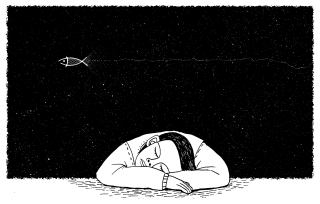Sleep
Music Could Help You Sleep Better
Research suggests potential sleep and well-being benefits of listening to music.
Posted March 30, 2023 Reviewed by Lybi Ma
Key points
- Researchers have considered whether listening to music before bed might improve sleep quality.
- Results from a randomized cross-over experiment suggest falling asleep to music may be beneficial.
- Not all music is created equal, the features of the music you listen to may matter.

Music has the power to move us, but does it have the power to help us sleep better? According to recent research, it does. Using a cross-over experiment in which 62 young adults listened to five nights of happy music, five nights of sad music, and five nights of pink noise (in randomized order), Majeed and colleagues found that people reported sleeping better and feeling more positive, less negative (including less stressed), and more satisfied with life on mornings after listening to music while falling asleep.
These benefits were found when comparing listening to music with listening to pink noise. Given that pink noise is thought to help deepen sleep, the additional beneficial effects of music beyond pink noise are impressive. Does the type of music matter? There were no differences in sleep quality and well-being when comparing happy and sad music. Importantly, all of the music was instrumental—happy music was always in major key while sad music was always in a minor key, but all of the music was selected with the goal of being calming and relaxing.
The findings from this experiment align with prior work that has found music to be a sleep aid. For example, clinical researchers have shown that music therapy can improve sleep quality when people have acute and chronic sleep disorders. And although this study focused on young adults, other research has found effects in randomized controlled trials with older adults, suggesting music might be helpful across the lifespan.
Why would music have these beneficial effects? Little research has directly tested the reasons why music improves sleep quality but suggested reasons include relaxation, a distraction from unwanted thoughts, and masking of unpleasant background noise.
It is important to know that this work has primarily focused on people’s self-reported sleep. For example, in the randomized cross-over experiment, people completed questions about their sleep experience each morning. So while this tells us important information about people’s perceptions of their sleep (which are related to many important outcomes), we cannot conclude that music actually changes more objective aspects of sleep (such as how much deep sleep the participants got, or how restless they were during the night) that have been linked to physical and mental health.
Want to try music therapy yourself? Researchers have found the music that people report as successfully helping them sleep tends to be characterized by legato (rather than staccato) articulation, low to medium rhythmic activity, and a lower main frequency register.
If you are like me and know little about music, I looked it up and learned that legato music is fluid and continuous rather than brisk and sharp (staccato). Even better, the researchers who examined features of music that aided sleep provided some examples of successful music, including:
J’y suis jamais allé (Tiersen, 2010)
Moonlight Sonata (Beethoven, 2010)
You Are so Beautiful (Gibson & Evans, 2017)
Clair de Lune (Debussy, 2008)
My Piano, the Clouds (Paterlini, 2013)
And some examples of unsuccessful music:
Baby I (Grande, 2013)
I Am Somebody (Santana, 2017)
Fergalicious (Fergie, 2009)
Keep Me in Love (Hồ Ngọc Hà, 2017)
Chop Suey (System Of A Down, 2009)
Need more suggestions for what to listen to when you fall asleep? In the randomized cross-over experiment, the researchers created a 30-minute music track for each of their conditions, using songs like “Beginning” (Megan Wofford), “Evening Waltz” (Helmut Shenker), and “Rain” (Valter Nowak) in their happy condition, and “Awake” (Megan Wofford), “Empathy” (Gavin Luke), and “Solace” (Franz Gordon) in their sad condition.
References
Chen, C. T., Tung, H. H., Fang, C. J., Wang, J. L., Ko, N. Y., Chang, Y. J., & Chen, Y. C. (2021). Effect of music therapy on improving sleep quality in older adults: A systematic review and meta‐analysis. Journal of the American Geriatrics Society, 69(7), 1925-1932.
Dickson, G. T., & Schubert, E. (2022). Musical features that aid sleep. Musicae Scientiae, 26(3), 497–515. https://doi.org/10.1177/1029864920972161
Majeed, N. M., Lua, V. Y., Chong, J. S., Lew, Z., & Hartanto, A. (2021). Does bedtime music listening improve subjective sleep quality and next-morning well-being in young adults? A randomized cross-over trial. Psychomusicology: Music, Mind, and Brain, 31(3-4), 149.


